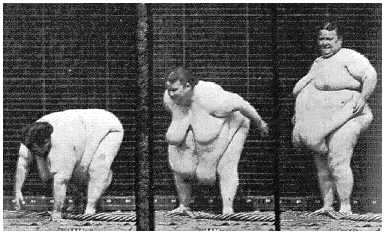First Year
Becoming a Teacher
In America
Abby Goodnough
(Public Affairs/Perseus)
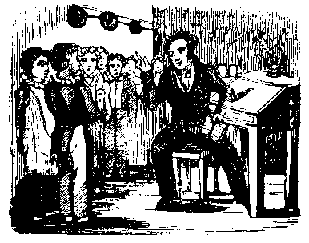
There isn't much around to make us fall in love with or even care for Donna, or her students, or most of all, the author. Goodnough wrote all this as a reporter for that MEGO [mine eyes glaze over] daily grind, the New York Times. She wrote for "Education," the MEGO-squared section, a writing sinecure not exactly bubbling with light and fun.
Ms. Moffett's First Year is a wonky report on a silly experiment to rescue the New York's public schools from the state legislature, the teacher's union, and the school bureaucracy. All agree that changes --- deep changes --- are necessary. Students may already be starting the process of burning down the school buildings (excellent sentiment), but, unfortunately, many of the old ones --- both buildings and administrators --- are still around.
The state and local authorities are busy dumping even more money --- your money, my money --- into that proven blowhole of a decaying institution instead of passing a few laws that would allow the teachers to beat the shit out of recalcitrant, noisy, and out-of-control students.
Perhaps the school system could invest in a few dozen new rulers: When I was a student in the Bronx, fifty years ago, a swift swat across the knuckles was all that was needed to keep us interested in the proceedings. Our Ms. Daugherty was not at all interested in back talk, and she certainly wasn't stupid enough to try to plead with us to behave. She also didn't have to put up with the likes of a prison-guard clone vice-principal looking over her shoulder because she didn't need one.
She could handle us just fine: A whack or two was all that was required to keep us on course. In the principal's office downstairs, the back up, a wooden paddle called a "fanny-warmer" was always available in times of dire emergency .
Too bad that Goodnough isn't a enough of a visionary to suggest this most appropriate solution. It's so simple, and being simple, everyone overlooks it. My advice: stop bringing in martyrs like Ms. Moffett to plug the failings of the Teacher's Union and the dead weight of bureaucracy. Get the state legislature to establish ten schools, ten model schools based on the standards that were in use fifty years ago. Give several hundred worthy teachers the power to kick ass and run the classrooms as they should be run. Accept students only if the parents sign agreements to allow the teachers to be in charge. Do not permit anyone from the teacher's union or any school board members or bureaucrats to get in the front door. Ditto reporters from the tendentious Times.
Just let the teachers teach, and at the end of the year, compare the accomplishments of the students in our Retrograde Model School with those of the remainder of the school system --- private and public. Let the best one win.
Outside of this, if you want the real skinny on teaching in New York --- one that's wise and has some life to it --- read Elizabeth Gold's Brilliant Intervals of Horrible Sanity.

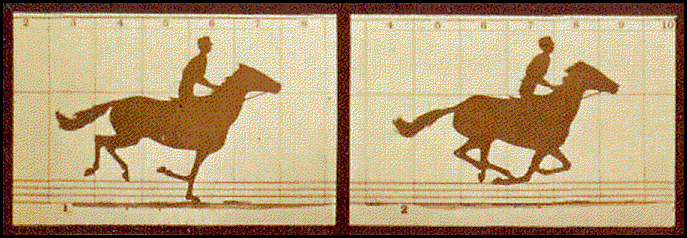
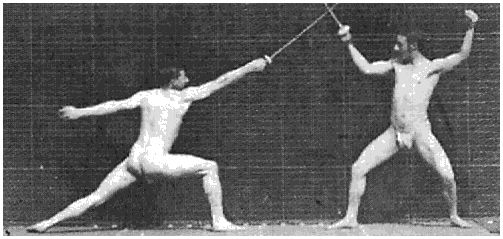 Through a purloined letter, Edward (or Edweard) found that Larkyns had fathered a child by Flora, and then had fled to Calistoga. Muybridge mounted a horse, perhaps one that had been the subject to his photography experiments and high-tailed it off to the Yellow Jacket Mine where he found Larkyns playing cribbage. He called him to the door, and called him to task by delivering the following speech, in full Victorian rotundity:
Through a purloined letter, Edward (or Edweard) found that Larkyns had fathered a child by Flora, and then had fled to Calistoga. Muybridge mounted a horse, perhaps one that had been the subject to his photography experiments and high-tailed it off to the Yellow Jacket Mine where he found Larkyns playing cribbage. He called him to the door, and called him to task by delivering the following speech, in full Victorian rotundity: And bam! --- he plugged Larkyns right in the old ticker. And promptly turned himself over to the police.
And bam! --- he plugged Larkyns right in the old ticker. And promptly turned himself over to the police.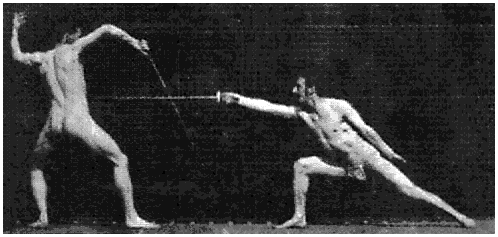 The reason I spend time on the workings of Muybridge's passion is that in this lengthy tome, with its almost three hundred pages, along with 100 photographs --- unless you consider multiple-shot photographs as more than one, so a case could be made for the fact that there are more than 500 photographs --- the reason we concentrate on this love stuff has to do with Prodger being so wordy.
The reason I spend time on the workings of Muybridge's passion is that in this lengthy tome, with its almost three hundred pages, along with 100 photographs --- unless you consider multiple-shot photographs as more than one, so a case could be made for the fact that there are more than 500 photographs --- the reason we concentrate on this love stuff has to do with Prodger being so wordy. 